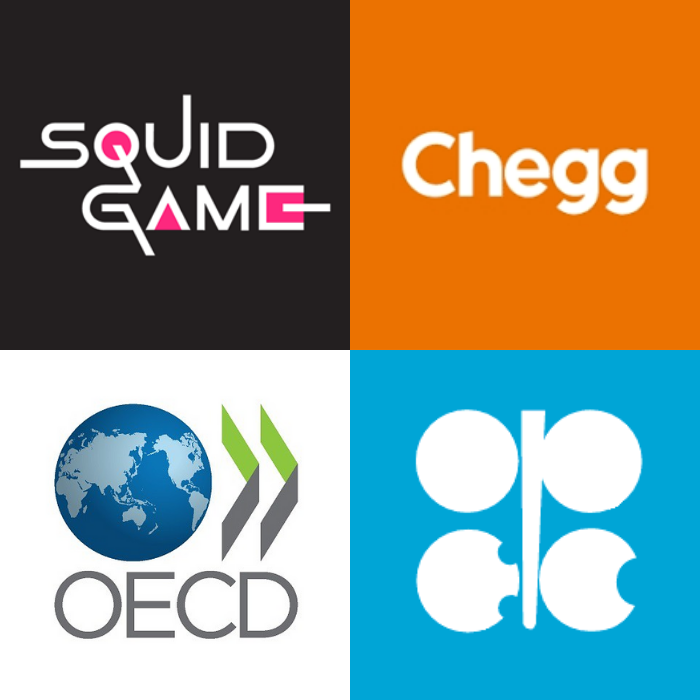This Week in Business (10/4): Chegg takes a hit as in-person learning returns, “Squid Game” bolsters Netflix’s international business, and more!
Netflix’s “Squid Game a smashing success,” Chegg takes a hit, OECD and OPEC shake up international business.
October 12, 2021
“Squid Game” expands Netflix’s international audience
Netflix hit the “green light” on its international expansion efforts with its latest South Korean survival drama, “Squid Game.” The dystopian thriller experienced a meteoric rise in popularity after releasing on Sept. 17 and is expected to garner nearly $82 million viewers within its first month of release, surpassing “Bridgerton” as the most-watched show on Netflix.
“Squid Game” is a part of Netflix’s larger effort to expand its subscriber base beyond North America following a 400,000 drop in US subscribers over the past year. By the end of this year, Netflix will have spent nearly $1.2 million dollars on movie and TV production in South Korea alone.
And the buck doesn’t stop with South Korea. Netflix plans to spend upward of $8 billion dollars on international television this year in the hopes of replicating the successes of international dramas like the Colombian “Narcos” or France’s “Lupin.”
Investors are moderately optimistic about Netflix’s future success on the international stage — Netflix, Inc. shares ($NFLX) are up nearly 4% this past week.
Global minimum tax deal slated to cut deep into corporate profits
The Organization for Economic Cooperation and Development, a coalition of the 38 most economically powerful nations in the world, is spearheading a global tax deal that would raise the minimum tax rate for corporations to 15% across all signatory countries.
Following the frenzy of pandemic-induced stimulus spending that many nations found themselves caught up in, governments are clamping down on tax-evasive corporations to increase tax revenue and balance their budgets.
European countries such as Ireland have historically competed with other countries to keep their corporate tax rates as low as possible so as to attract foreign investment. Ireland — which maintained a corporate tax rate of 12.5% until it signed on to the OECD’s deal this week — houses the European headquarters of companies such as Google, Facebook, Airbnb, and Twitter which account for almost 80% of Ireland’s tax revenue.
The deal has over 140 signatories as of this week (not yet including the US) and is slated to take effect in 2023.
Transition to in-person learning causes dip in popular learning supplement’s share price
Over the past month, Chegg corporation’s stock has been dropping drastically. Chegg is an online supplemental resource used to enhance conceptual understanding of school concepts.
Many times it’s also used as means of posting answers to homework, test questions, etc. Due to the learning struggles that came along with online school, it made it a very desperate time, in which people needed online supplements. As a result, Chegg’s valuation skyrocketed over quarantine.
However, being back in school has decreased the learning gap creating a smaller need for supplements such as Chegg. At the peak of virtual school, Chegg’s Stock was at $77 though as of this week it’s around $62.28.
OPEC won’t provide more oil supply – oil prices are jacked up in California
In historic news, California gas prices topped five dollars (80 dollars per barrel) as of this week. In a society where the cost of living is drastically rising, how do oil prices play a part? The reason for the pretentiously high oil prices is a supply shortage in which oil companies are refusing to produce more oil, while subsequently increasing oil prices.
From another perspective, China is usually the world’s biggest consumer of oil, though recently given the collapse of the Evengrande group and China’s economic slowdown, there is less use of oil. Regardless of this decrease in consumption, oil prices remain sky-high.
What effect would this have on an average consumer’s daily life? With a lack of oil production, there is a high possibility that this supply shortage will spill into the energy market, causing energy prices to be significantly higher. While we do not know the complete picture yet, global figures such as Vladimir Putin are planning to increase energy production.



